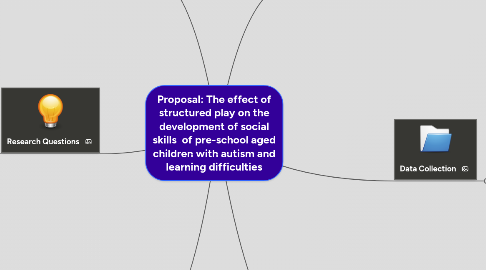
1. 8 Participants
1.1. 4 Females
1.1.1. Kindergarten
1.1.1.1. Mila
1.1.1.1.1. Learning difficulties
1.1.1.1.2. Interventions
1.1.2. Pre Primary
1.1.2.1. Tess
1.1.2.1.1. Learning difficulties
1.1.2.1.2. Interventions
1.1.2.2. Amy
1.1.2.2.1. Learning difficulites
1.1.2.2.2. Interventions
1.1.2.3. Nina
1.1.2.3.1. Learning difficulties
1.1.2.3.2. Interventions
1.2. 4 Males
1.2.1. Kindergarten
1.2.1.1. Edward
1.2.1.1.1. Learning difficulties
1.2.1.1.2. Interventions
1.2.1.2. Ryan
1.2.1.2.1. Learning difficulties
1.2.1.2.2. Interventions
1.2.2. Pre Primary
1.2.2.1. Evan
1.2.2.1.1. Learning difficulties
1.2.2.1.2. Interventions
1.2.2.2. Lou
1.2.2.2.1. Learning difficulties
1.2.2.2.2. Interventions
2. Research Questions
2.1. How can scripted roleplaying scenarios in the classroom, and structured play on the playground, assist in the development of social skills of kindergarten and pre-primary students with autism and learning difficulties?
2.2. How can teacher-directed play in the classroom and on the playground, assist in the development of social skills of kindergarten and pre-primary students with autism and learning difficulties?
2.3. How can scripted role-playing scenarios in the classroom, assist in the development of social skills of pre-school students with autism and learning difficulties.
3. Ethical Considerations
3.1. Participants
3.1.1. Parent Information Sheet
3.1.2. Parent Consent Form
3.1.3. Students are allowed to withdraw from the intervention at any time
3.1.4. Teacher information sheet
3.1.5. Teacher consent form
3.2. Data Collection
3.2.1. Written observations
3.2.2. Audio recording of interviews and activities
3.2.2.1. Written transcripts of interviews and activities
3.2.3. Checklists
3.2.4. Photographs
3.2.4.1. Student's worksamples
3.2.4.1.1. Verbal permission gained to take photographs of worksamples
4. Intervention Program
4.1. Scripted role-playing /pretend play
4.1.1. Store scenario
4.1.1.1. Toy Shop
4.1.1.1.1. Customer
4.1.1.1.2. Shop keeper
4.1.1.2. Sports Equipment Shop
4.1.1.2.1. Customer
4.1.1.2.2. Shopkeeper
4.1.2. Garden
4.1.2.1. Gardener
4.1.2.2. Using garden tools
4.1.2.3. Shopping for things for the garden
4.1.2.4. The jobs you do in a garden
4.1.2.5. Building a garden with play dough or other concrete materials to pretend play with
4.1.3. Zoo
4.1.3.1. How to look at animals
4.1.3.2. How to comment about what you see at the zoo
4.1.3.3. Appropriate behaviour at the zoo
4.1.3.4. Building a zoo using blocks and doing pretend play
4.2. Structured playground play
4.2.1. How to use the playground equipment
4.2.2. How to interact with others on the playground
4.2.3. Appropriate behaviour on the playground
4.3. Additional information
4.3.1. Students attend the Early Intervention Program at the Sunshine Room on a part-time basis
4.3.1.1. 2 times a week
4.3.1.1.1. New node
4.3.1.2. 1 Morning session and 1 afternoon session
4.3.1.2.1. Each session goes for 2 and a half hours
4.3.2. Students attend a (public) mainstream setting when they are not at the Sunshine Room
4.3.2.1. Kindergarten
4.3.2.2. Day care
4.3.2.2.1. Only Ryan
4.3.2.3. Pre-Primary
4.3.3. Sunshine Room
4.3.3.1. The Special Needs Unit
4.3.3.2. Provides small group support to children of pre-school age who cannot cope with full integration into mainstream schools at this stage
4.3.3.3. Part of the Child Study Centre at The University of Western Australia
4.3.3.4. Setting
4.3.3.4.1. Classroom with attached bathroom and kitchenette
4.3.3.4.2. Playground separate from the kindergarten and pre-primary class
4.3.3.5. Staff
4.3.3.5.1. 2 Teacher assistants (only one present at a time)
4.3.3.5.2. 1 Teacher
5. Data Analysis
5.1. Qualitative analysis of data
5.1.1. Comparison of the Social Play Checklist at the diagnostic stage to the summative stage
5.1.2. Comparison of the Pretend Play Checklist each time it is used in formative assessment
5.1.3. Comparison of the Play Checklist each time it is used in formative assessment
6. Data Collection
6.1. Diagnostic assessment
6.1.1. Social Play Check-list developed by University of Washington, Project DATA, November 2004
6.2. Formative assessment
6.2.1. Play Checklist: Pathways to Play: Developing Play Skills in Young Children. 1992
6.2.2. Pretend Play Checklist:TalkAbility: People Skills for Verbal Children on the Autism Spectrum, 2006
6.2.3. Written observations/anecdotes
6.3. Summative assessment
6.3.1. Social Play Check-list developed by University of Washington, Project DATA, November 2004
6.3.2. Interview with the teacher
